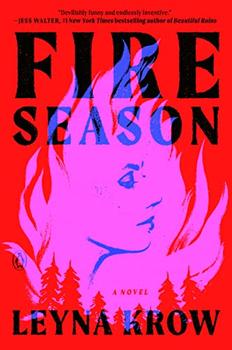Summary | Excerpt | Reading Guide | Reviews | Beyond the Book | Readalikes | Genres & Themes | Author Bio

A Novel
by Leyna Krow
His very first morning in Spokane Falls, he joined up with a group of other young men heading farther east to Coeur d'Alene. But once employed as a miner, Barton found the work did not suit him. It was an exhausting, dirty chore with no end. And so, after just two days, he quit and returned to Spokane Falls.
Back in town, it was his intention to go from business to business and inquire if any were hiring. It turned out he only needed to make one stop. The manager at the bank asked Barton if he could read and write and if he owned a second clean set of clothes. Barton said yes, and was told he could start as assistant manager right away. Six months later, this same manager skipped town to escape an improbably large gambling debt, leaving Barton in charge. Barton often thought back to this early turn of events. He wondered, had he gone into a different establishment first on his job hunt that day, might he now be living a completely different life-that of a hotelier, or a newspaperman, or even a dentist? Instead he'd ended up in a profession just as dreary as law. He'd borne his lot diligently these past six years, thinking surely the head of the only bank within a hundred miles was a position that, if taken seriously (as Barton took all things seriously), would make him a big man in the community. A respected man. Like his father in Portland, but less of an ass. This, however, had not turned out to be the case.
The big men of Spokane Falls weren't the men with two sets of clean clothes. They were prospectors in search of new claims. Loggers and sawmill workers covered in pitch, laughing loud in the bars. Cavalrymen telling stories of harrowing adventure and unceasing cruelty. They were men who held themselves up with their own bare, bleeding hands, who typified the wildness and ruggedness of a place that prided itself on being wild and rugged. The bank-holder of debts, giver of loans, reminder of reason and responsibility-was the opposite of all these things. And Barton himself, the personification of this oppositeness.
Spokane Falls had grown in the six years Barton had been there. At first, every building in town was made of wood, as if it were a prop in a play. The streets were dirt, which turned to mud in spring. Recently, though, Barton thought Spokane Falls had come to resemble a real city. There were three daily newspapers, an opera house, and a very fine bakery. And now, in 1889, Washington Territory was on the verge of being granted statehood. With that would come new money and new development. The flimsy clapboard buildings of the first half of the decade had mostly been replaced with more permanent structures. Many, like the bank, were made of brick or stone.
Barton wished he too could grow. He wished to be a city of a man. But Spokane Falls had not taken him along in this way. He felt the place picked on him just as his father had. If he had wanted to continue to be an abused rule follower, he would have stayed in Portland. For a long time, he had not known what to do about this problem.
Then he had decided to kill himself.
Then he saw the fire, and decided to do something else instead.
She thought about the city's changes too, sometimes. Though she felt no demands from it personally. And, conversely, she did not demand anything of it. A city was not a person. And even with people, she was not one to hold particular expectations.
She liked the bakery also, and the newspapers. The hotel where she lived got a single copy of each paper delivered in the mornings, and since most of the other residents weren't readers, she usually had her pick, even if she slept in. She had not been to the opera, but she appreciated the idea of it. For her, more than anything, the city was defined by sound. First it was the sawmill, all day and night, a din no one could escape. Then the trains came, pacing the day with their arrivals and departures. The rattle of horsecart wheels on the paved streets in the mornings. The shouting of men in the same streets after a certain time of night. Then, for a few hours again, only the sawmill.
Excerpted from Fire Season by Leyna Krow. Copyright © 2022 by Leyna Krow. All rights reserved. No part of this excerpt may be reproduced or reprinted without permission in writing from the publisher.
Your guide toexceptional books
BookBrowse seeks out and recommends the best in contemporary fiction and nonfiction—books that not only engage and entertain but also deepen our understanding of ourselves and the world around us.